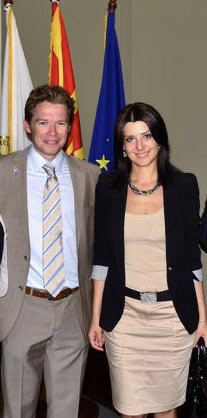
The Team Type 1 Foundation and Abbott partner to donate glucose meters and nearly 12 million test strips to help people living with diabetes in Rwanda
Kigali, Rwanda – January 16, 2020 – Resulting from a good partnership with the Ministry of Health, Abbott through the Team Type 1 Foundation has donated glucose meters and close to 12 million test strips to advance disease management for people diagnosed with Type 1 diabetes in Rwanda for the next four years.
Glucose meters and test strips are important tools to help people manage their diabetes however, some living with Type 1 diabetes are unable to afford meters or test strips. The FreeStyleOptium Neo glucose meters and 11.7 million FreeStyleOptium test strips will provide access to ongoing diabetes care in Rwanda. This donation is in partnership with the Team Type 1 Foundation, a non-profit organization pursuing a global mission of education, empowerment and equal access to medicine for everyone affected by diabetes.
The Government of Rwanda responded to the global call to tackle the increased burden of diabetes by ensuring improved access and quality of care is delivered at all level of the health system including primary health facilities close to the population, said Dr. Patrick Ndimubanzi, The Minister of State in Charge of Primary Health care in Rwanda. The fight against diabetes and other NCDs is a high priority on the agenda of the Ministry of Health and will continue to work with all our partners to mitigate the impact of this deadly disease, The Minister insisted.
“We are thrilled to bring this initiative to life and help support the Rwandan diabetes community,” said Bernard Brisolier, Business Unit Director for Abbott’s Diabetes Care business in Africa. “By working together with the Ministry of Health and Team Type 1 Foundation, we will empower thousands of people living with diabetes in Rwanda to monitor their glucose levels and manage their diabetes, which will help them lead healthier and fuller lives.”, he added.
“It is a dream come true to receive this donation from Abbott. Since 2010, the Team Type 1 Foundation has been present in Rwanda through the Tour of Rwanda and our work with the Rwanda Diabetes Association. We have seen the will of the people to succeed against the challenges diabetes presents, which is why Team Type 1 has been so dedicated for the past 10 years to advance access to diabetes care in Rwanda,” Team Type 1 Founder and President Phil Southerland said.
Abbott is an active healthcare provider in Africa in general and in Rwanda in particular. Since the beginning of 2019, the company has collaborated with the Ministry of Health and a leading NGO, on a pilot program including the launch of eight second-generation health posts in Bugesera District. The initiative aims at providing primary healthcare services within a 30-minute walk of all Rwandan homes. Health post workers will test and treat people, including pregnant women and new-born children for multiple infectious and non-communicable diseases.
Collaborating with governments, healthcare professionals, diabetes experts and individuals living with diabetes around the world, the Team Type 1 Foundation contributes to bridge the gap to access and education through sustainable and economically viable solutions.
According to the STEPS Survey 2014, Diabetes prevalence in Rwanda is 3 per cent and 2,000 among the patients have type 1 diabetes.
In this regards, The Rwandan vision is “To protect Rwanda’s population from morbidity and mortality related to NCDs including Diabetes”, so that Rwandans are instrumental in socio-economic transformation initiative, for the achievement of the Sustainable Development Goals (SDGs) by 2030. These can be achieved through cooperation with different stakeholders at national and international levels.
Rwanda has put different measures to fight diabetes, these include; Community check up and sensitization for early detection, decentralization and integration of diabetes care to health centre level, health system strengthening through capacity building and development of normative tools, increase of accessibility and affordability of diabetes commodities, medicine and lab tests, inclusion of diabetes care into medical insurance scheme among others.
Government Advocacy
The struggle of children in Rwanda represents a microcosm of the global problem – there are not enough test strips, insulin and education about diabetes all over the world.
A wide variety of worldwide health care systems seek the WHO-sanctioned goal of good health, responsiveness to the expectations of the population and fair financial contribution. Evaluation of health systems includes the “Five C’s”: Cost, Coverage, Consistency, Complexity and Chronic Illness. Also, continuity of health care is a major objective.
Diabetes is one of the primary chronic diseases that all health systems attempt to address, developing a variety of different models to resolve this issue. And while all health systems struggle with providing a good model to care for this population, diabetes simply does not see the level of funding dedicated to other chronic diseases.
The Macedonian Ministry of Health has developed a model for distribution of diabetes supplies, which has proven effective for many years. TT1 will adapt and employ the Macedonian model, primarily within developing countries as well as others.
Since insulin and test strips with glucose meters are required for patients with diabetes:
- Centralized government procurement of insulin is recommended for one to two years in order to achieve discounted pricing.
- National Institute for Health and Care Excellence (NICE) guidelines http://guidance.nice.org.uk/CG for treating patients with insulin
- Networking of all diabetes institutions in order to follow the national registry of patients, which will be developed if the infrastructure does not exist
TT1 will collaborate with other foundations, international health organizations, first-world governments and others to raise funds for buying and donating diabetes supplies to countries in need. TT1’s approach is also to advocate for government involvement toward providing supplies for its own diabetes population.
TT1 will measure its impact through:
- Improvement of managing blood glucose
- Improvement of Hb A1c measurements
- Governments provision of diabetes supplies (insulin, test strips, etc.)

